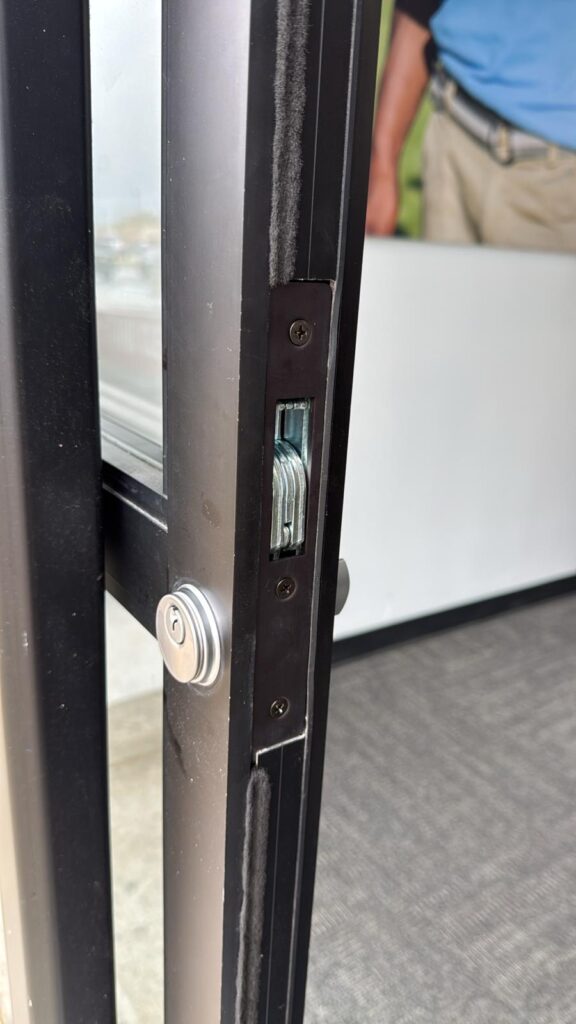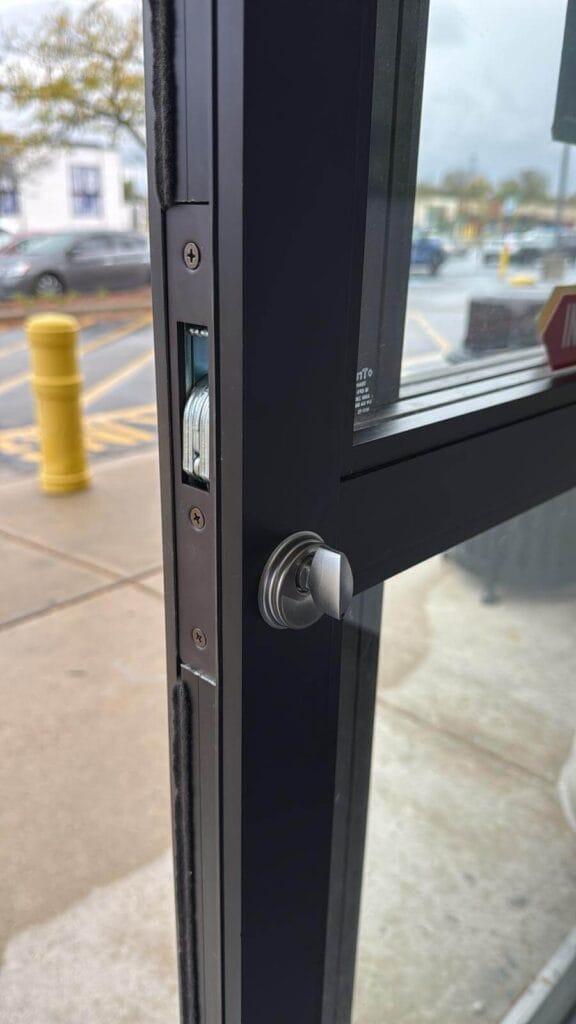Every business owner understands the importance of securing their premises, but one often-overlooked aspect of security is the practice of rekeying business locks after an employee leaves. This simple yet effective measure can make a world of difference when it comes to protecting your business assets. Whether the departure is amicable or otherwise, failing to address lock security might just be opening doors to potential risks.


“A small investment in lock rekeying can save you from big losses in the future.”
Consider the impact of not rekeying business locks. You might unwittingly be giving unauthorized individuals access to your business premises. Therefore, understanding the significance of this practice is crucial for maintaining a secure environment.
- Prevent unauthorized access
- Reduce the risk of theft or vandalism
- Ensure peace of mind for you and your employees
Join us as we delve into why rekeying should be a non-negotiable part of your security protocol when an employee departs.
Rekeying Business Locks Facts:
Businesses that rekey locks regularly are less likely to experience theft or data breaches.
Failing to rekey locks can lead to potential liability issues for businesses.
Regular rekeying can enhance the overall security posture of a business.
Rekeying Business Locks Statistics:
75% of employees have stolen from their employer at least once
Employee turnover rates in the US average around 18% annually
Businesses that rekey locks after turnover report a 30% decrease in security incidents
40% of small businesses do not change locks after an employee leaves
85% of businesses that rekey locks report improved employee peace of mind
45% of businesses do not change locks after an employee leaves, increasing security risks
How often do businesses experience employee turnover?
Employee turnover is a common occurrence in businesses across various industries. According to the U.S. Bureau of Labor Statistics, the average annual turnover rate in the United States hovers around 20% to 30%, although this can vary significantly depending on the industry and the specific nature of the business.
Certain sectors, such as retail, hospitality, and food services, tend to experience higher turnover rates, often exceeding 50% annually. This is largely due to the seasonal nature of the work, part-time positions, and the typically younger workforce in these industries.
Conversely, industries such as healthcare, education, and government tend to have lower turnover rates, often below 15%. These sectors often provide more stable employment opportunities, comprehensive benefits, and career development paths, which contribute to employee retention.
Small businesses may experience higher turnover rates compared to larger corporations. This can be attributed to factors such as limited career advancement opportunities, fewer resources for employee engagement, and sometimes less competitive compensation packages.
Understanding the turnover rate specific to your industry and business size is crucial for implementing effective security measures, such as rekeying business locks, to protect your assets and maintain a secure environment.
Are there industry standards for rekeying after turnover?
While there are no universally mandated industry standards specifically requiring businesses to rekey locks after employee turnover, many security experts and organizations recommend it as a best practice. The decision to rekey often depends on the nature of the business, the level of security required, and the potential risks associated with unauthorized access.

Certain industries, particularly those dealing with sensitive information or high-value assets, may have internal policies or guidelines that suggest or require rekeying business locks as part of their security protocols. For example, sectors like finance, healthcare, and technology often have stricter security measures due to regulatory requirements and the sensitive nature of the data they handle.
In addition to industry-specific guidelines, insurance companies may also have recommendations or requirements regarding rekeying locks as part of their coverage conditions. Failing to follow these recommendations could potentially impact a business’s insurance claims in the event of a security breach.
Ultimately, while there may not be a one-size-fits-all standard, the practice of rekeying business locks after employee turnover is widely regarded as a proactive measure to safeguard a business’s physical and intellectual assets. It is advisable for business owners to assess their individual security needs and consult with security professionals to establish appropriate rekeying policies.
What are the cost implications of rekeying vs. not rekeying?
Rekeying business locks after an employee leaves can initially seem like an added expense, but it is a proactive measure that can prevent more significant financial losses in the long run. The cost of rekeying typically involves the locksmith’s service fee and the price of new keys, which is generally affordable for most businesses. This investment ensures that only current employees have access to the premises, thereby reducing the risk of unauthorized entry.

On the other hand, not rekeying locks can lead to potential security breaches. If a former employee retains a key, they could access the business without permission, potentially leading to theft, vandalism, or data breaches. The financial implications of such incidents can be substantial, including the loss of valuable assets, increased insurance premiums, and potential legal fees.
Additionally, the reputational damage from a security breach can have long-term financial consequences. Customers and clients may lose trust in a business’s ability to protect sensitive information, leading to a loss of business and revenue. The cost of rebuilding trust and reputation can far exceed the initial expense of rekeying business locks.
In summary, while rekeying involves an upfront cost, it is a cost-effective strategy to safeguard a business’s assets and reputation. The potential financial and operational risks of not rekeying can be significantly higher, making rekeying a prudent investment in the security and continuity of the business.
What are the potential legal liabilities of not rekeying business locks?
Failing to rekey locks after an employee leaves can expose a business to potential legal liabilities related to negligence. If a former employee retains access and uses it to commit theft or vandalism, the business could be held liable for not taking reasonable steps to secure its premises. This could result in costly legal policies often require businesses to maintain certain security standards. If a security breach occurs due to not rekeying business locks, the insurance company may deny claims for losses incurred. This could battles and damage to the business’s reputation.

Businesses have a duty of care to provide a safe environment for employees and customers. If an unauthorized person gains access and causes harm, the business could face legal action for failing to ensure safety. This duty extends to taking reasonable precautions, such as rekeying business locks when an employee leaves, to prevent unauthorized access.
Not rekeying locks can also lead to violations of industry-specific regulations or standards that mandate certain security protocols. Non-compliance with these regulations can result in fines, penalties, or even the loss of licenses necessary to operate, further compounding the legal and financial repercussions for the business.
What is the process of rekeying business lock in Indianapolis?
When rekeying a business lock in Indianapolis, your initial step involves evaluating the current lock system. Contact a reputable local locksmith, like those in the vibrant Fountain Square neighborhood or the bustling area of Broad Ripple. These professionals will disassemble the lock cylinder, reorganize the internal pins, and create new keys that fit the reshaped cylinder. Many businesses in downtown Indianapolis have found this process to be swift, usually completed within an hour, depending on the complexity and the number of locks involved.

Consider asking your locksmith for a security assessment during your appointment. Many Indianapolis-based locksmiths offer complimentary evaluations, especially those servicing the areas around Monument Circle. This extra step ensures that your rekeyed locks align with the specific safety needs of your business environment. Additionally, keep in mind the local climate when choosing locks, as this can affect the longevity and effectiveness of your security systems here in Indianapolis.
Are there cost-effective ways to rekey business locks?
In the Indianapolis metro area, there are several cost-effective strategies to consider when rekeying business locks of your company. Firstly, partnering with local locksmiths who offer competitive rates can help keep expenses in check. Many Indianapolis locksmiths provide free estimates and may offer discounts for commercial clients or bundle services.
It’s also wise to explore options that don’t break the bank, like scheduling regular maintenance services. By doing so, you might be able to avoid any urgent and potentially more costly rekeying needs. Additionally, some locksmith companies in the region offer membership plans or subscriptions that offer benefits such as reduced rates on rekeying services.

Moreover, Indianapolis business owners can leverage online reviews and customer testimonials to find reliable and affordable locksmith services. Websites like Yelp or Angie’s List often list trusted locksmiths in Indianapolis, which can be a helpful starting point for cost comparisons.
Another cost-saving tip is to inquire about the types of locks that are compatible with more cost-effective rekeying options. By choosing locks that accommodate easier rekeying processes, you might be able to reduce overall expenses in the long run.
Remember, while it’s crucial to find cost-effective solutions, business security should never be compromised. Ensure that any service provider you select in the Indianapolis area is reputable and experienced in commercial security needs.
What are the alternatives to rekeying locks for securing a business?
For business owners in the Indianapolis metro area, it’s crucial to consider all available security options when thinking about alternatives to rekeying locks. Whether your main goal is cost-effectiveness or enhanced security, several solutions are worth exploring.
Access Control Systems: These systems offer a high-tech solution by allowing you to grant or revoke access with a digital setup. You can find numerous local companies specializing in customized access control systems to suit various business needs. Additionally, installing these systems supports real-time monitoring capabilities, which is ideal for businesses that require a higher level of security.
Smart Locks: As innovation continues to drive security advances, businesses in Indianapolis may consider smart locks. These allow remote access management and can be integrated with other systems for convenience. Local hardware stores and security companies can provide installation and support services, ensuring you have expert advice tailored to your specific requirements.
Security Cameras and Surveillance: While not a direct substitute for rekeying, incorporating a comprehensive surveillance system can enhance security by deterring unauthorized access. Local vendors in Indianapolis can offer tailored solutions that include video analytics and remote monitoring features, making it a strong complementary option.
When deciding on the best option, consider reaching out to local locksmith professionals or security consultants in Indianapolis for expert advice. This will ensure your business is optimally protected against potential security breaches, giving you peace of mind.
Is it necessary to rekey locks if an employee returns business keys?
Despite an employee handing back their keys, the decision to rekey is not solely dependent on the return of physical keys. In the Indianapolis metro area, the importance of rekeying extends beyond recovering a key. You face potential security risks if an employee, albeit unintentionally, duplicates a key for convenience or by mistake.
Indianapolis’s bustling business scene—ranging from tech firms in Broad Ripple to retail establishments in Castleton—requires attentive security measures. Rekeying ensures that your business doesn’t rely on the assumption of secure key recovery. It fortifies access control, adapting promptly to any personnel changes.

Moreover, local locksmith services in Indy, such as Mobile Locksmith Indianapolis, offer tailored solutions. These services are designed to efficiently upgrade your security based on specific zoning requirements or unique business needs.
Ultimately, prioritizing a rekey—even if the keys are returned—safeguards against unforeseen access risks and maintains the integrity of your security protocols.
What should business owners consider when choosing a locksmith for rekeying?
When selecting a locksmith in the Indianapolis metro area, it’s pivotal to choose someone with experience and a solid reputation. Start by researching local locksmiths online; look for reviews on platforms like Yelp or Google. Assess their ratings and read customer testimonials to gain insight into past client experiences.
Another crucial factor is ensuring the locksmith is licensed and insured. Contact them directly to verify their credentials and ask about their insurance coverage. This will safeguard you against any damage that might occur during the rekeying process. Additionally, inquire about their response times, especially if you require urgent services.
Consider the scope of services offered. A reputable locksmith in Indianapolis should not only be adept at rekeying but also provide advice on advanced security systems, if you’re considering future upgrades. It’s prudent to discuss pricing transparently; ask for an estimate upfront and confirm there are no hidden fees. Many locksmiths offer competitive rates without compromising on quality, so exploring multiple quotes will be beneficial.
Lastly, consider the locksmith’s community involvement. Those engaged in the local community often demonstrate reliability and a commitment to service excellence. By diligently vetting locksmiths based on these criteria, you can confidently secure a trusted professional to maintain the safety and security of your business premises in the Indianapolis area.
What are the benefits of rekeying versus replacing locks?
In the Indianapolis metro area, rekeying your business locks can offer you tailored benefits that cater to the city’s unique security needs. While replacing locks involves installing entirely new hardware, rekeying allows you to alter the locking mechanism so existing keys no longer function. This saves both time and money—a crucial consideration for budget-conscious Indianapolis businesses seeking efficient security solutions.

Moreover, many locksmiths in Indianapolis provide quick rekeying business locks services, which means minimal disruption to your operations. Since the city is home to many small to medium enterprises, rekeying becomes an attractive option for maintaining security without the larger investment of completely new locks. Indianapolis businesses, often located in bustling areas with high foot traffic, find that the speedy, cost-effective nature of rekeying aligns well with their fast-paced environments.
Leveraging local locksmith expertise is essential. These professionals are familiar with the specific crime patterns in different Indianapolis neighborhoods, offering additional insights into how often you should consider rekeying versus replacing. This local perspective ensures your business’s security strategy is both proactive and tailored to local conditions, providing peace of mind in the heart of the Hoosier State.
